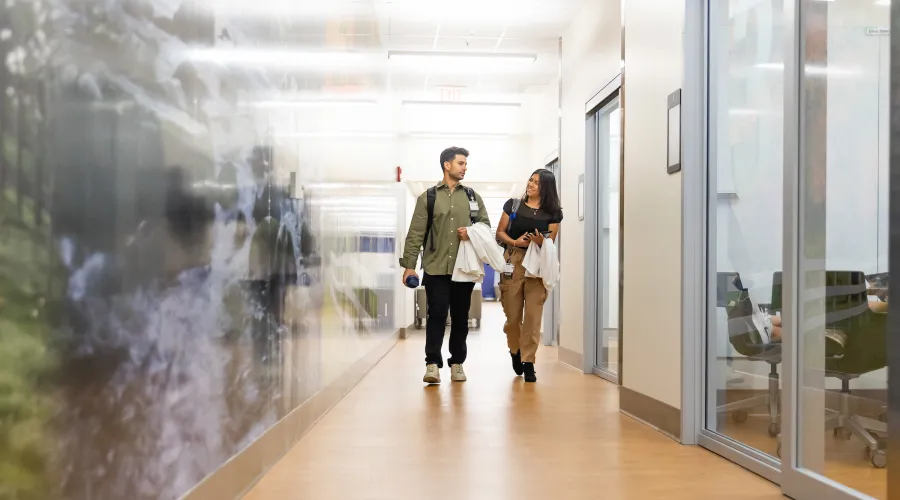
Before You Apply
Thank you for your interest in pursuing a medical education at the University of Kentucky College of Medicine. Students should pursue a broad and rigorous undergraduate curriculum and seek out extracurricular activities that will prepare them for a medical career. Regardless of where you pursue your undergraduate degree, you should contact the premedical advisor at your college or university to help guide your preparation for medical school. We also strongly recommend you check AAMC Pre-Med Worksheets for The Official Guide to Medical School Admissions.
Undergraduate Major Degree Programs
You may choose any major you wish. It is neither expected nor required that you major in a science field, and every field of study helps students develop skills that contribute to a successful medical career.
Things to Know Before Applying to the UK College of Medicine
Prerequisites
Medical science and practice involve complex relationship between physical, biological, psychological, cultural, and environmental aspects of human behavior. In the preparation for medical school, fundamental undergraduate college training in biology, chemistry, physics, and English is essential. Minimal requirements are satisfied with the following or their equivalent:
Required:
- Two courses of studies in physics (6 credit hours)
- Two courses of studies in biological sciences (6 credit hours)
- Four courses in chemistry (12 credit hours)
- One course, organic chemistry (3 credit hours)
- One course, biochemistry (3 credit hours)
- Two courses involving critical writing, synthesis of scholarship, and oral presentations/speaking skills (6 credit hours)
- No specific prefix designation (e.g. ENG prefix, upper-level seminars, humanities courses, or a 500-level foreign language courses if the language is other than your primary language).
Advanced Placement (AP) credit is accepted for all required courses if the AP course is accepted for credit at the student’s undergraduate institution, no matter the specific course designation by the undergraduate institution.
Recommended*:
- Anatomy
- Behavioral Sciences
- Genetics
- Humanities
- Psychology
- Physiology
- Social Sciences
- Statistics OR Biostatistics
*We recognize that pre-medical students may have elective schedule options. Some of these students may look for guidance as to what courses may help them in their future medical training or careers. We offer these recommendations solely for that reason. Students come from diverse backgrounds with variable opportunities. Any choices in their regard will not influence admission decisions.
Prerequisites
Medical science and practice involve complex relationship between physical, biological, psychological, cultural, and environmental aspects of human behavior. In the preparation for medical school, fundamental undergraduate college training in biology, chemistry, physics, and English is essential. Minimal requirements are satisfied with the following or their equivalent:
Required:
- Two courses of studies in physics (6 credit hours)
- Two courses of studies in biological sciences (6 credit hours)
- Four courses in chemistry (12 credit hours)
- One course, organic chemistry (3 credit hours)
- One course, biochemistry (3 credit hours)
- Two courses involving critical writing, synthesis of scholarship, and oral presentations/speaking skills (6 credit hours)
- No specific prefix designation (e.g. ENG prefix, upper-level seminars, humanities courses, or a 500-level foreign language courses if the language is other than your primary language).
Advanced Placement (AP) credit is accepted for all required courses if the AP course is accepted for credit at the student’s undergraduate institution, no matter the specific course designation by the undergraduate institution.
Recommended*:
- Anatomy
- Behavioral Sciences
- Genetics
- Humanities
- Psychology
- Physiology
- Social Sciences
- Statistics OR Biostatistics
*We recognize that pre-medical students may have elective schedule options. Some of these students may look for guidance as to what courses may help them in their future medical training or careers. We offer these recommendations solely for that reason. Students come from diverse backgrounds with variable opportunities. Any choices in their regard will not influence admission decisions.
Medical College Admission Test (MCAT)
The MCAT is required of all medical school applicants. The test assesses mastery of basic concepts in biology, chemistry, and physics, and facility with scientific problem-solving and logical reasoning. Students applying for medical school admission are strongly advised to take the MCAT in the spring of their junior year in college. Also, please be aware that it is the policy of the University of Kentucky College of Medicine to only accept MCAT scores that fall within the previous two years of the current application cycle.
For the 2025 entering class application cycle, the oldest score accepted is January 2022. Learn more about preparing for the MCAT.
Medical College Admission Test (MCAT)
The MCAT is required of all medical school applicants. The test assesses mastery of basic concepts in biology, chemistry, and physics, and facility with scientific problem-solving and logical reasoning. Students applying for medical school admission are strongly advised to take the MCAT in the spring of their junior year in college. Also, please be aware that it is the policy of the University of Kentucky College of Medicine to only accept MCAT scores that fall within the previous two years of the current application cycle.
For the 2025 entering class application cycle, the oldest score accepted is January 2022. Learn more about preparing for the MCAT.
Evaluation Letters
Work with the premedical advisor at your college or university to determine your best strategy. If your college has a premedical committee, the UK College of Medicine requires that you use their recommendation process and forms. If a committee does not exist, your premedical advisor may provide a composite evaluation from contributing faculty at your school. If neither of those options exist, seek three individual evaluation letter which meet the UK College of Medicine letter requirements.
Evaluation Letters
Work with the premedical advisor at your college or university to determine your best strategy. If your college has a premedical committee, the UK College of Medicine requires that you use their recommendation process and forms. If a committee does not exist, your premedical advisor may provide a composite evaluation from contributing faculty at your school. If neither of those options exist, seek three individual evaluation letter which meet the UK College of Medicine letter requirements.
Personal Qualities
Medical schools seek outstanding, well-rounded students who possess extraordinary interpersonal skills. Intelligence, caring for others, integrity and honesty, leadership, reliability, stamina and strongly tested motivation for medicine are necessary personal qualities. We recommend that students take time to develop self-health strategies, time-management skills, and personal support systems. It is important to deal appropriately with pressures of balancing educational or professional demands with personal life.
Personal Qualities
Medical schools seek outstanding, well-rounded students who possess extraordinary interpersonal skills. Intelligence, caring for others, integrity and honesty, leadership, reliability, stamina and strongly tested motivation for medicine are necessary personal qualities. We recommend that students take time to develop self-health strategies, time-management skills, and personal support systems. It is important to deal appropriately with pressures of balancing educational or professional demands with personal life.
Exploration of Medical Careers
Take time to explore whether medicine is the right profession for you, and, more specifically, whether being a physician is your best role. Talk to physicians about their experiences. Shadow physicians in their offices or in the hospital. Volunteer in a health care facility. Check out AspiringDocs for more information on the medical profession. Your experiences should provide you with a realistic perspective to confirm your reasons for pursuing this profession.
Exploration of Medical Careers
Take time to explore whether medicine is the right profession for you, and, more specifically, whether being a physician is your best role. Talk to physicians about their experiences. Shadow physicians in their offices or in the hospital. Volunteer in a health care facility. Check out AspiringDocs for more information on the medical profession. Your experiences should provide you with a realistic perspective to confirm your reasons for pursuing this profession.
Interests and Work Experience
Medical schools seek versatile and well-balanced individuals who have had a variety of life experiences. Hobbies are a means of expanding your talents and interests beyond your formal education. Work experiences enable applicants to develop special qualities including leadership, organizational skills, the ability to work with people, and proficiency in dealing with timelines and finances.
Interests and Work Experience
Medical schools seek versatile and well-balanced individuals who have had a variety of life experiences. Hobbies are a means of expanding your talents and interests beyond your formal education. Work experiences enable applicants to develop special qualities including leadership, organizational skills, the ability to work with people, and proficiency in dealing with timelines and finances.



